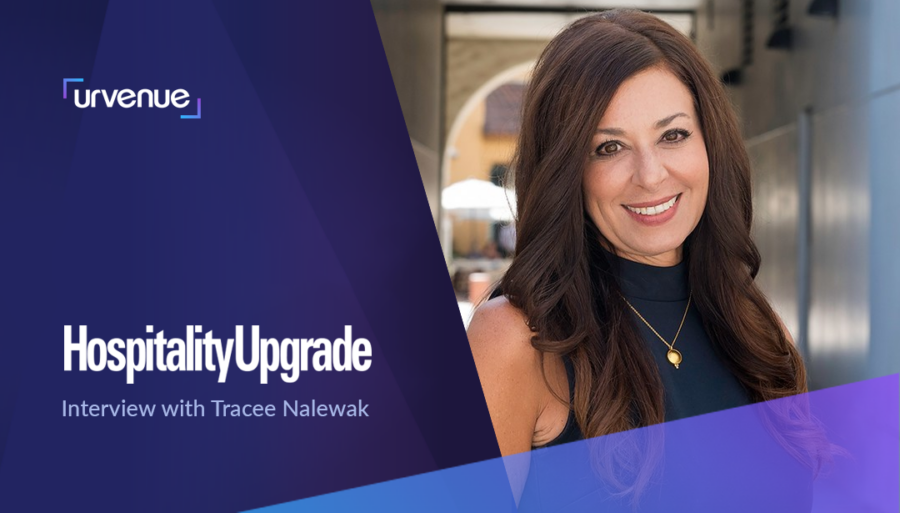
Hospitality Upgrade Interview with: Tracee Nalewak
A new technology acronym has emerged in hospitality—PXMS. Not to be confused with the hotel PMS (property-management system), PXMS focuses solely on the guest experience (X) beyond the guestroom. A Property Experience Management System is a full-cycle solution platform that enables resort leaders to sell their experience-based inventory with as much flexibility as their rooms.
We wanted to learn more about this new segment and the impacts it can have on our industry, and sat down with Tracee Nalewak, Chief Growth Officer at UrVenue. Nalewak’s 30-year career in the hospitality, entertainment, and gaming industries encompasses varied executive roles in marketing, customer experience, CRM and sales for hospitality brands including MGM Resorts, IHG, Caesars Entertainment and Hakkasan Group (now Tao Group).
HOSPITALITY UPGRADE: What is a Property Experience Management System (PXMS)?
TRACEE: The easiest way of describing a PXMS is to first look at what a PMS does. A PMS sells room inventory, manages hotel operations, and provides operational and financial insights. A PMS also has distribution and yielding capabilities to help maximize revenue and occupancy. A PXMS should do all of the above, but for a property’s Non-Room Inventory (NRI). This half of the business hasn’t traditionally received as much attention as rooms have, despite the revenue potential and the importance to guests.
The diagram shows how the PXMS is just as important as the PMS.

HOSPITALITY UPGRADE: What is non-room inventory?
TRACEE: Non-room inventory (NRI) can be amenities, experiences and activities, or ancillary lines of business. Examples include pools and beaches, nightclubs and dayclubs, entertainment showrooms, spas, golf courses, lounges and bars, sportsbooks, seasonal pop-ups and special events, restaurants and their private dining rooms, small group meeting spaces, resort day passes, and unique experience packages (such as fire pits and s’mores). But it can even include third-party inventory such as walking tours or helicopter rides. Many of these assets have often been underutilized, because, until the launch of the PXMS, we haven’t had a mechanism to seamlessly incorporate them into the guests’ booking and in-stay journey.
HOSPITALITY UPGRADE: There are many booking engines already that can sell NRI. What makes the PXMS booking engine different?
TRACEE: There are several differences, but three stand out. A PXMS is a connected platform including operations, inventory, and booking engine.
Most booking engines selling NRI aren’t connected to the actual operational/inventory system in use. There are big disadvantages to this approach from resources (users must manually move bookings from one system to another) to limiting your ability to manage inventory in real-time and the benefits that go along with that, like yielding. On the room side, a PMS is fully connected — from booking engine to inventory to operations. A PXMS, like a PMS, is fully connected and can be leveraged the same way.
A PXMS booking engine is built specifically for varied, experience-based inventory.
For a booking engine to be effective with experience-based inventory, it must be robust. Every individual property has unique and diverse offerings that require varied commerce approaches. Unlike most one-size-fits-all booking engines, a PXMS’ booking engine can handle all the necessary booking types including but not limited to: reservations, daily rentals, day-parted rentals, space/items-by-the-hour, all types of ticketing (general admission, multi-day ticket, etc.), F&B minimums, add-ons and upgrades, memberships, guest lists, invitations and RSVPs, inquiry forms, custom quotes, or any combination thereof. Most hospitality booking engines are built for room inventory, and lack the complexity needed to successfully drive non-room inventory conversions.
A PXMS booking engine manages experiences across an entire property, in a single interface.
Lastly, a PXMS booking engine can manage all the experiences across a property in a single interface and in a single, unified shopping cart. Not only can guests build their own itineraries, but property operators can more easily upsell, cross-sell, and package their experiences to really wow their guests. If you ask any customer experience (CX) or marketing executive in our industry, this is the holy grail.
HOSPITALITY UPGRADE: Why do you think it has taken the industry so long to launch a category like this?
TRACEE: NRI is complex and varied. A property’s restaurant sells and operates their experiences differently than a spa or golf course, and a pool or beach sells and operates their experiences differently than a restaurant. Because of this, our industry has organically adopted singular, venue-based solutions built specifically for one style of operation (like spa) making it difficult to leverage across other outlets/experiences.
HOSPITALITY UPGRADE: What are the benefits or impact for the hotel guest?
TRACEE: The “Amazonification” of the world has fueled a demand for convenience, control and choice. Further, the expectation is there that all things can be done in the palm of one’s hand. Too many times, we make it hard for our guests to experience the best of our properties, because the booking journey for non-room inventory is fractured. The PXMS gives guests access to book non-room inventory with the same ease and flexibility they have when booking hotel rooms.
HOSPITALITY UPGRADE: What should the industry focus on during the PXMS’ first year in-market?
TRACEE: The PXMS is innovative technology that is going to alter how we conduct business and how our guests interact with us. With any cutting-edge solution, education will be key to drive adoption. We are at an exciting starting point for this technology, which will continue to evolve and grow as forward-thinking organizations work with solution providers to develop new, innovative uses for it. The PXMS is a game changer, and our industry needs to take note.
Read the Hospitality Upgrade article here: https://mag.hospitalityupgrade.com/spring-2023/page-114

Tracee Nalewak is chief growth officer at UrVenue, a hospitality technology platform that powers commerce, enhances the guest experience and monetizes resort real estate by leveraging non-room inventory across all customer touchpoints in the booking and in-stay journey.